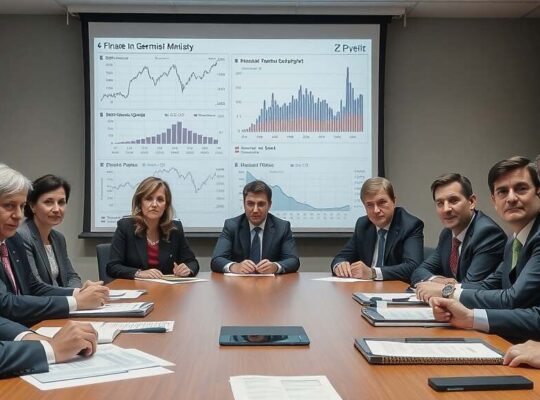Germany’s state-level financing deficit significantly decreased in the first half of 2025, reaching 28.9 billion euros. This represents a decline of 19.4 billion euros compared to the same period in 2024, according to data released Friday by the Federal Statistical Office (Destatis). As a percentage of gross domestic product (GDP) in current prices, the deficit for the first half of 2025 is calculated at 1.3 percent.
The federal government contributed the largest share to the overall state deficit, accounting for 16.7 billion euros. However, the federal deficit itself decreased considerably by 10.5 billion euros compared to the first half of 2024. State-level (Länder) deficits also fell sharply, decreasing by 10.3 billion euros to 1.3 billion euros (11.6 billion euros in the first half of 2024).
Conversely, the financing deficit for municipalities increased by 4.7 billion euros to 14.2 billion euros (9.5 billion euros in the first half of 2024). Social security funds, however, registered a surplus of 3.3 billion euros in the first half of 2025, compared to a balanced budget in the same period of the previous year.
The 28.9 billion euro deficit for the first half of 2025 stems from a difference between revenues of 1,042.0 billion euros and expenditures of 1,070.9 billion euros. Revenue increased by 6.5 percent compared to the previous year, while expenditure growth was lower at 4.3 percent.
State tax revenues rose by 5.1 percent in the first half of 2025. Value-added tax (VAT) saw a significant increase of 6.9 percent, while income tax revenues increased by 4.6 percent. Social contributions increased sharply by 8.9 percent, largely due to increased supplementary contributions to statutory health insurance and increases in care insurance contribution rates and assessment ceilings in January 2025. State interest income, however, fell by 18.9 percent.
Significant increases were recorded in monetary social benefits – including pensions and unemployment benefits – rising by 20.3 billion euros (+5.8 percent) compared to the first half of 2024. Social benefits in kind – encompassing services such as doctor and hospital treatment, medication and social welfare benefits – also rose, increasing by 13.5 billion euros (+7.1 percent).
The increase in expenditures was also driven by a rise in state employee wages of 10.9 billion euros (or 6.3 percent) compared to the previous year. This was partially offset by a 12.9 percent reduction in subsidies, primarily due to lower compensation payments for renewable energies.
State interest expenditure increased by 5.8 percent to a total of 24.3 billion euros in the first half of 2025. Gross investment rose by 3.7 percent to 59.6 billion euros, according to the statistical office.












